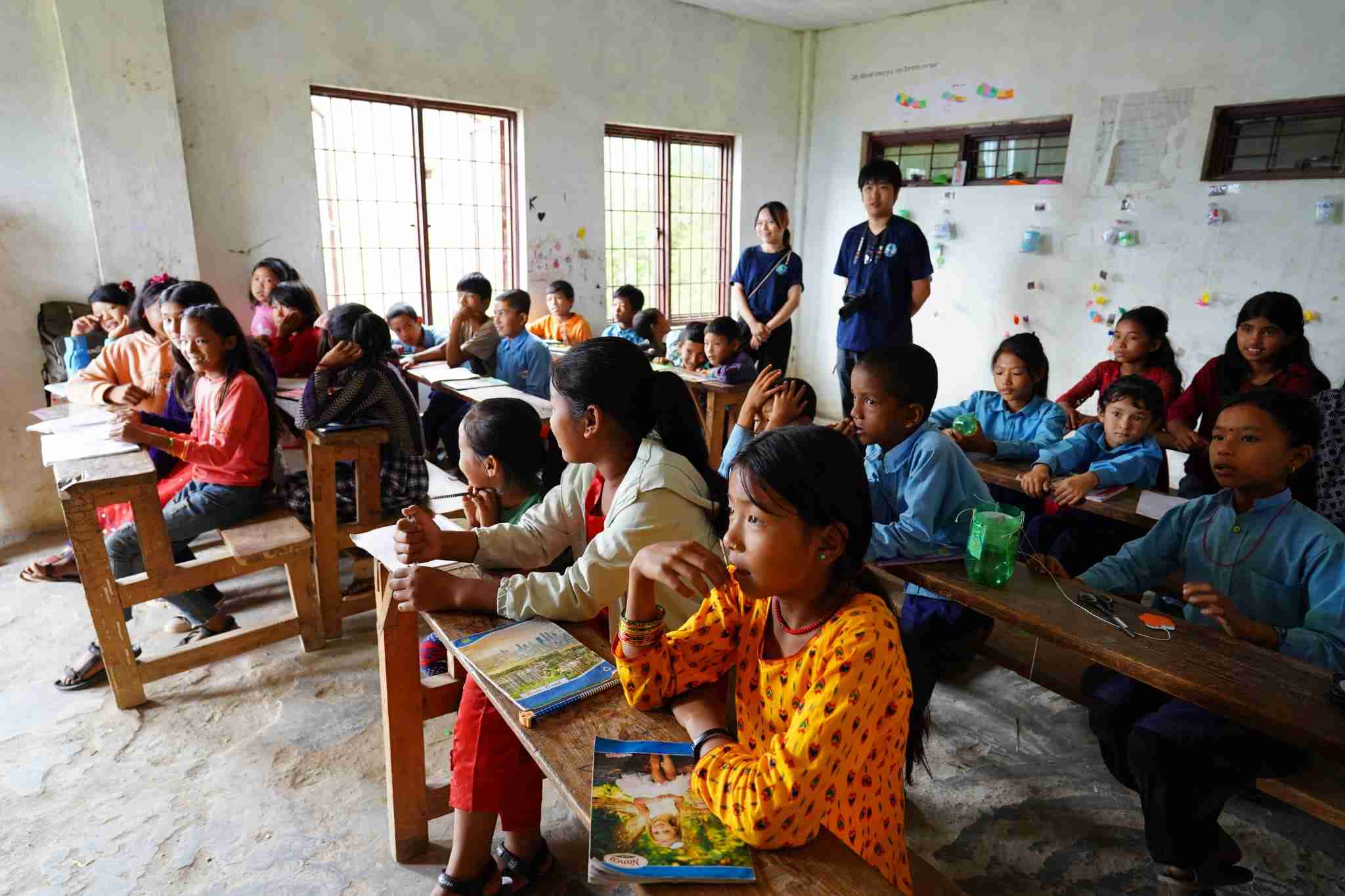Project Overview
Child Protection Volunteer Nepal – Safeguarding and Empowering Children
| 📍 | Location | Outskirts of Kathmandu & Okhaldhunga |
| 📅 | Start Dates | Every 1st & 3rd Monday |
| ⏳ | Duration | 2 weeks to 10 months |
| ⏰ | Working Hours | 3-6 hrs/day, 5 days/week |
| 🏡 | Accommodation & Food | Stay with a host family or at a volunteer hostel |
| 👥 | Eligibility | Open to volunteers 18+, families, couples, & groups |
| 🛡️ | Safety & Support | 24/7 assistance & secure placements |
| 🎓 | Orientation | 2-3 days on arrival training |
| 🌏 | Weekend Travel | Explore festivals, temples, Himalayas, & immerse in culture |
| 💰 | Fees | Transparent; covers essentials.Click here to learn more |

Child Protection Volunteer Nepal – Safeguarding and Empowering Children
Are you passionate about volunteering with children in Nepal in a meaningful, life-transforming way? Are you looking for child welfare volunteer opportunities in Nepal that enable you to protect vulnerable children, advocate for their rights, and make a lasting social impact? Our Child Protection Volunteer Nepal program fulfills this need. By working closely with orphanages, community childcare centres, and youth mentorship groups, these volunteering efforts aim to strengthen local capacity and enrich young lives. Join us to help raise a new generation free from neglect, exploitation, or adverse conditions, while also discovering the cultural wonders of Nepal.
Project Description
Introduction
“Nurturing the Next Generation” is the heartbeat of our child protection volunteer Nepal program. Nepal is celebrated for its scenic peaks, vibrant temples, and communal warmth. However, it also grapples with economic constraints that leave many children vulnerable. Volunteers in our program step into local institutions—small orphanages, transitional shelters, or group childcare settings—to supply knowledge, resources, and heartfelt care. Volunteers bring stability and positivity that these kids might otherwise lack by creating creative lessons, establishing daily routines, and forming heartfelt bonds with children.
Background
Nepal’s social welfare framework historically faces ongoing strain due to poverty, geographic isolation, and inconsistent funding. According to UNICEF, 30% of Nepal’s population is under 15, and many face substandard living conditions, minimal schooling, and risk factors like trafficking or child labour. Community childcare volunteers in Nepal’s roles and robust child protection laws strive to keep kids safe. Yet local efforts often suffer from staff shortages, limited budgets, and uneven training. By supporting volunteers in children’s homes in Nepal or Nepal childcare volunteer projects, you close these gaps, ensuring children benefit from the attention and enrichment they deserve.
Key Objectives
- Promote Child Welfare: Ensure daily emotional and educational support, bridging basic needs while nurturing healthy growth.
- Uphold Child Rights: Incorporate knowledge of child protection laws and empowering activities aligned with Nepal child rights volunteer programs.
- Boost Educational Engagement: Provide tutoring, creative lessons, or volunteer teaching children Nepal sessions that expand kids’ minds.
- Foster Emotional Security: Offer consistent mentorship or companionship, particularly for those lacking stable parental figures.
- Reinforce Community Resilience: Train local caretakers, share best practices, and help develop sustainable structures beyond your volunteering term.
The Need
- Statistical Evidence: A 2021 Government of Nepal report estimates that over 11,000 children live in orphanages or group homes, often short on consistent, quality care. Meanwhile, thousands more remain at high risk of trafficking, forced labour, or abandonment without intervention.
- Local Stake: Families suffering economic stress can’t always meet children’s basic or educational requirements. As a result, kids might drop out of school early or face indefinite institutional care with minimal resources.
Global Relevance
Children’s rights are universal. Child welfare volunteer opportunities in Nepal align with the UN Sustainable Development Goals (particularly SDG 4: Quality Education and SDG 16: Peace, Justice, and Strong Institutions) and harness global empathy for child well-being. By volunteering, you champion universal child protection, bridging the philanthropic spirit and cultural immersion. Collective efforts ensure no child is overlooked due to poverty or geographical disadvantage.
Local Voices
“We wanted more than basic shelter for these kids—we wanted them to dream. Volunteer mentors introduced arts and reading sessions and taught them self-worth. It’s transformed our centre.” – Sarita, caretaker at a children’s shelter in Pokhara.
Below are 10 essential tasks for those who join child protection volunteer Nepal projects:
- Daily Child Support: Provide emotional care—listening, counselling, and consistent reassurance to children lacking stable guardians.
- Teaching & Tutoring: Conducted literacy, math, or English tutorials as part of child development volunteer Nepal tasks or facilitated extracurricular sessions.
- After-School Program Volunteering Nepal: Lead group activities, from arts & crafts to sports. Stimulate creativity and teamwork among children.
- Health & Hygiene Education: Introduce basic personal hygiene routines, healthy eating tips, or first-aid guidance, bridging local caretakers’ capacity.
- Youth Mentorship Volunteer Nepal: Mentor older teens on leadership, conflict resolution, or career exploration.
- Volunteer in Children’s Hospitals Nepal: (If relevant) Coordinate with medical staff to offer reading, creative play, or emotional comfort to hospitalised kids.
- Special Needs Childcare Volunteering Nepal: Provide specialised attention to kids with physical or developmental disabilities, bridging therapy, or inclusive education strategies.
- Volunteer at Children’s Shelters Nepal: Assist staff with meal prep and site cleanliness, implement structured daily routines, and foster stable child development.
- Counseling & Encouragement: For traumatised or neglected children, supply a warm presence, carefully listening to and affirming their stories.
- Peer Learning Initiatives: Organise older kids to tutor or read stories to younger peers, cultivating leadership and confidence.
- 08:30 – 09:15: Breakfast at volunteer lodging or homestay
- 09:15 – 10:00: Commute or walk to the childcare facility or group home
- 10:00 – 13:00: Facilitate morning lessons, supervise infant care, or plan educational games
- 13:00 – 14:00: Lunchtime, often local Nepali dal bhat or a simple meal with staff and kids
- 14:00 – 16:00: Mentor older youth, oversee creative workshops, or arrange community outreach
- 16:00 – 17:00: Return to your accommodations
- 17:00 – 18:00: Cultural immersion, personal reflection, or recreation
- Counseling Workshop: If skilled in psychology or social work, host small group sessions or stress management practices for kids or train local staff.
- Community Childcare Volunteer Nepal: Organise public health fairs or parent education evenings highlighting consistent child rearing, nutritional guidelines, or the importance of schooling.
Required Skills
- Compassion & Sensitivity: Many children have faced hardships; empathy fosters trust and emotional bonding.
- Communication: Clear English can suffice; local staff or older kids may help interpret.
- Adaptability: Resource availability can vary widely, so you’ll rely on creativity to keep kids engaged or reorganise lesson plans.
Eligibility
- Age: Usually 18+ (16+ possible if accompanied by a guardian or special arrangement).
- Time Commitment: At least two weeks is recommended. More extended placements allow deeper relationships, more significant impact, and continuity.
- Required Documentation: Valid passport, recommended travel insurance, and compliance with Nepali visa regulations.
Preferred Skills
- Child Development or Teaching Experience boosts your capacity to manage group sessions, handle varied learning paces, and address emotional needs.
- Cultural Sensitivity: Receptiveness to local beliefs and daily schedules fosters synergy with caretakers and children.
- Basic Nepali: Not mandatory, but it helps build immediate rapport with kids, especially younger ones.
Cultural Immersion
Nepal’s tapestry of festivals, markets, and family-centric customs enrich your volunteer journey:
- Festivals: Celebrations like Dashain or Tihar highlight the strong family bonds that revolve around blessings, feasting, and vibrant music.
- Nepali Cuisine: Volunteers typically enjoy dal bhat, fresh vegetables, pickles, and, occasionally, meat or fish. Shared mealtimes often spark laughter and storytelling.
- Homestays: If chosen over volunteer houses, you’ll experience daily chores, neighbourhood gatherings, and morning greetings in Nepali, forging heartfelt cross-cultural connections.
Language Learning
- Basic Nepali: Greetings like “Namaste” and simple phrases can bring immediate closeness to kids, bridging communication.
- Daily Interactions: You might pick up day-to-day vocabulary organically through chores or communal dinners, which kids also love helping you practice.
Accommodation
- Volunteer House: Shared dorm-style lodging, fostering friendships with fellow volunteers. A shared dining area, lounge, or garden is used for group reflection.
- Homestay: Private or shared room with a local family for deeper cultural immersion. Expect to help with small chores and enjoy consistent language practice.
Meals
- Daily Nepali Fare: Typically, two or three are provided, usually dal bhat (rice, lentils), vegetable curry, and sometimes chicken or fish.
- Dietary Preferences: If you inform us beforehand, vegetarian or special diets are accommodated.
Transportation
- Airport Pickup: Project staff or local partners greet you at Kathmandu’s Tribhuvan International Airport.
- Local Commutes: Travel by bus, shared taxi, or on foot to orphanages or after-school programs, depending on distance.
On-Site Support
- Coordinators: Offer orientation, daily scheduling, and conflict resolution.
- Local Staff: Orphanage directors, teachers, or social workers who co-create volunteer plans and track child progress.
Health and Safety
- Vaccinations: Consult your physician for recommended shots, e.g., Hepatitis A/B or Typhoid.
- Travel Insurance: Essential to cover medical, flight, or personal mishaps.
- Emergency Protocol: Our staff contacts local clinics, ensuring swift responses if emergencies occur.
For details on the cost, see our Program Fees page. Typically, your fee covers:
- Accommodation (volunteer house or homestay)
- Meals (two or three daily)
- Orientation and local staff guidance
- Basic Supplies relevant to childcare or teaching tasks
Excluded: airfare, visa fees, personal insurance, or optional tourism adventures.
Volunteer Impact
- Personal Growth: Gain leadership, communication, and compassion by forging deep bonds with needy children.
- Professional Advantages: Relevant if you’re eyeing a career in social work, teaching, or child psychology—this experience stands out on any résumé or academic portfolio.
- Enhanced Global Awareness: You develop a nuanced perspective on challenges children in developing countries face, plus cross-cultural cooperation skills.
Community Impact
- Elevated Child Well-Being: Emotional support and structured lessons often spark improved academic performance and mental resilience among children.
- Resource Boost: Orphanages or shelters rely on volunteer presence for staff relief, new activity ideas, or small philanthropic resources (like donated books and clothes).
- Broader Social Sensitization: Children learning from international volunteers often become global-minded, carrying empathy and curiosity into adulthood.
Statistic: A 2021 local NGO report shows that homes with consistent foreign volunteer involvement record 28% higher educational performance among residents, indicating the tangible difference volunteer presence can make.
Success Stories and Testimonials
Volunteer Experiences

Alicia

Paul
Local Impact Stories


Jake
Application Process
Ready to champion these children’s futures? Follow these steps to join “Children First: Child Protection Volunteer Nepal”:
- Complete the Online Application: Start at VolunteeringNepal.org/apply-now to outline your background and timeline.
- Submit Your Resume: Attach your CV plus two references (academic or professional).
- Await Confirmation: We’ll notify you of acceptance and provide orientation modules.
- Pay the Booking Fee: The €150 deposit secures your spot and helps us plan effectively.
- Receive the Pre-Departure Pack: Access cultural, health, and teaching strategy insights for a seamless journey.
- Final Payment: Complete your program fee upon arrival or via transfer to finalise your volunteering arrangement.
FAQ’s
Not necessarily. Enthusiasm, patience, and willingness to learn are crucial. We provide orientation, and local staff guide you as needed.
At least two weeks fosters rapport with children, though longer stints deepen relationships and outcomes. Some volunteers stay 4+ weeks for maximum effect.
Many older children study English. Local staff can interpret if the younger ones are less fluent. Basic Nepali phrases help build trust quickly.
Yes, specific projects focus on hospital support or special-needs children. Indicate your preference or skill set, and we’ll match you appropriately.
We maintain strict child protection policies, verifying each orphanage or institution is legally registered, prioritising the child’s best interest, and ensuring volunteers complement rather than replace staff.
Basic living costs in Nepal are low. Any personal items, cafe visits, souvenirs, or optional tours remain out-of-pocket.
Some volunteers remain in touch or fund a child’s educational expenses. We can facilitate ongoing relationships with local organisations.
Join Us Today to Make a Difference!
Step into a world where compassion meets cultural exchange. By embracing these child protection volunteer Nepal projects, you become a beacon of hope for children who long for guidance, affection, and stability. Whether reading stories, leading sports sessions, or simply listening to a child’s dreams, every kind of act reshapes their perspective on life.
- Volunteer: Dive into tutoring, creative play, or emotional mentorship among the children.
- Intern: Align your academic path (e.g., social work, education, or psychology) with real-world child-focused experience.
Donate or Share: Extend your reach by funding improvements, sharing stories, or encouraging friends and family to volunteer.
Apply now or email us at support@vin.org.np. Let’s stand together in safeguarding Nepal’s next generation—one comforting smile, one encouraging word, one safer tomorrow at a time
